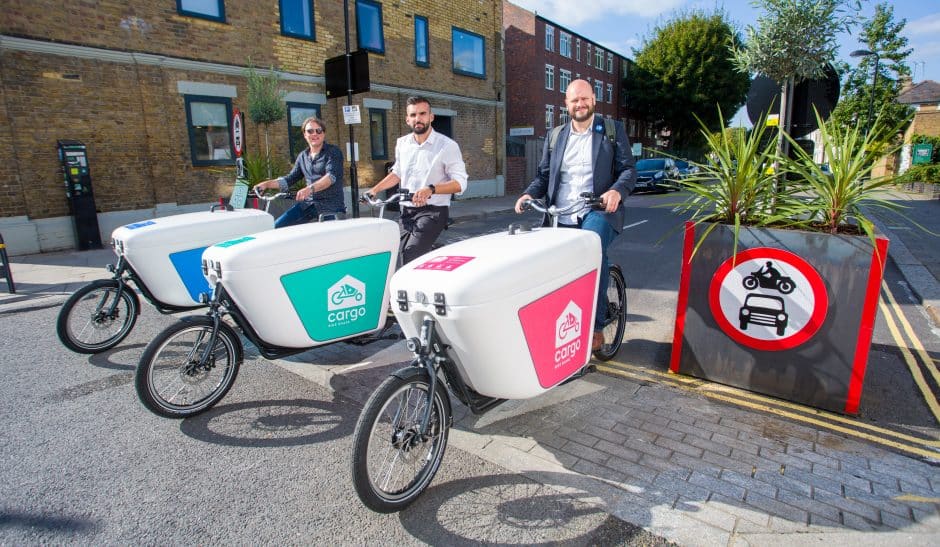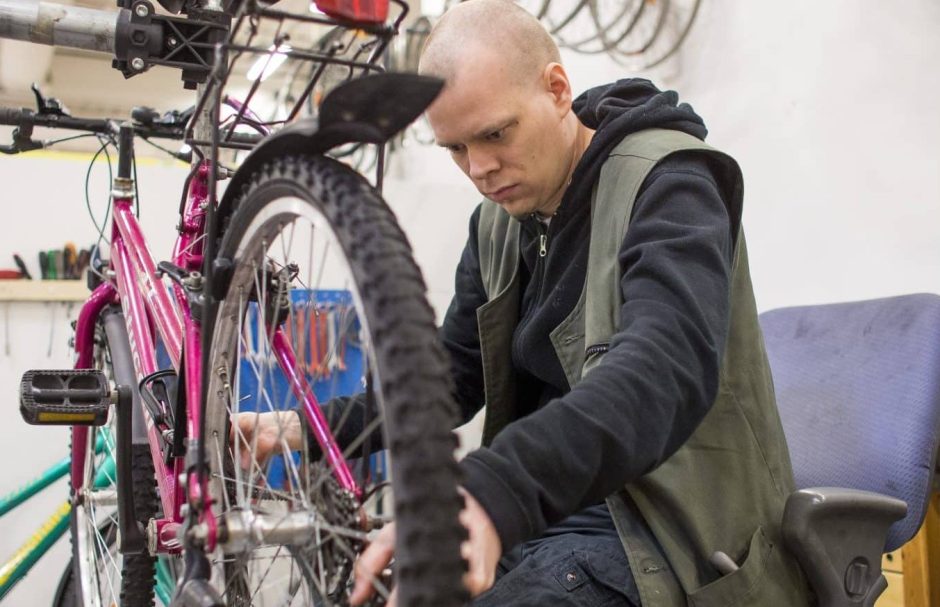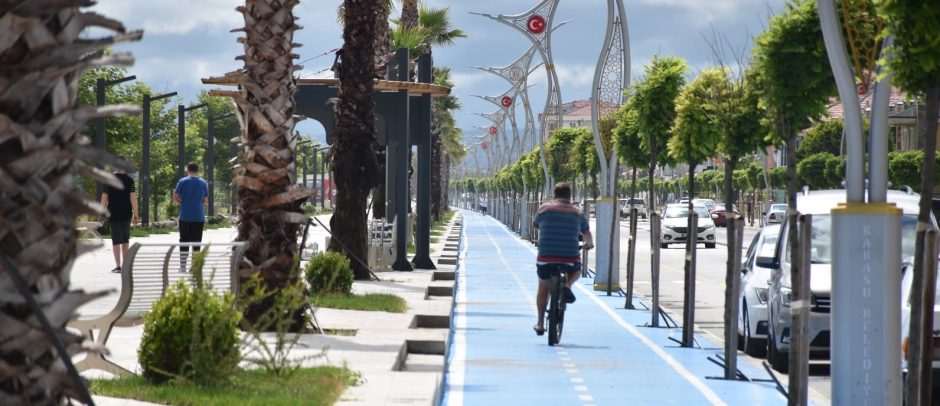Climate KIC and FedEx select four cities to scale sustainable mobility projects

Four cities from Türkiye and Europe have been awarded $240K (€223K) to implement solutions that accelerate the transition towards cleaner, greener, and smarter mobility as part of the first Sustainable Cities Climate Impact Challenge, co-organised by Climate KIC and EIT Digital, and sponsored by FedEx.
Responsible for more than 70 per cent of global CO2 emissions, cities can lead Europe’s pathway to a zero-carbon world. To support this transition, an open call was launched in November 2022 for municipalities to submit innovative projects that seek to decarbonise transport in European cities, accelerate the uptake of sustainable mobility solutions, and improve quality of life.
From a pool of 43 applications from 19 countries, the cities of Hackney (UK), Espoo (Finland), Olot (Spain) and Karasu (Türkiye) will receive grants of up to $70,000 (€65,000) to implement their pilot projects. The selected proposals stood out for their innovative approaches, strong city government support, and replicability to scale to other cities.
“We partnered with EIT Digital and Climate KIC to co-create a project in Europe where, we hope, it will positively contribute to wider climate objectives,” said Vinay d’Souza, Senior Vice President Planning and Engineering, FedEx Express Europe.
Meet the winning cities
Hackney, UK: Expanding cargo bike use
Population 280,000 / Award: $70,000 (€65,000)
The London Borough of Hackney established its Zero Emissions Network (ZEN) in 2012 to support businesses and residents transition toward more sustainable transport solutions. It targets barriers such as road danger, fear of cycling, cycle theft, high costs of bicycles, electric bikes and cargo bikes, and safe storage. By partnering with local business associations and e-cargo bike suppliers, the city aims to scale up proven ZEN activities to build an active network of businesses committed to zero-emissions transport over the long term, as well as share knowledge and learning with other cities for potential replication.
Councillor Mete Coban, Cabinet Member for Environment and Transport, London Borough of Hackney says: “In terms of tackling the climate crisis, Hackney is one of the most ambitious councils in the UK. Our plan is to create a greener, healthier Hackney, to reduce traffic and pollution, help people travel more healthily and create more livable neighbourhoods.”
Espoo, Finland: Cycle participation with immigrant outreach
Population: 272,000 / Award: $60,000 (€56,000)
Most Finns learn how to ride a bike at an early age, providing them access to low-cost, sustainable mobility. However, this is not the case for Espoo’s growing refugee and immigrant population where women and girls, in particular, have less access to such opportunities. The City of Espoo’s proposal has two aims: to increase cycling in a way that addresses social inclusion and gender equality while boosting business for local bicycle repair shops. Espoo is currently expanding its bicycle infrastructure, providing a sound basis for the project.
Pasi Laitala, Strategy Director of the City of Espoo says: “The project tackles the challenge of making sustainable transport modes such as cycling a more attractive, inclusive and available form of transport. The city of Espoo aims to be carbon neutral by the end of 2030, and therefore, a systemic change toward sustainable modes of transport is necessary to make the shift happen.”
Olot, Spain: Safe cycling storage to reduce anxiety and theft
Population: 36,000 / Award: $60,000 (€56,000)
The Catalonian town of Olot wants to address citizens’ concerns over the safety of long-term bike parking facilities. City council representatives propose installing a network of these facilities in areas with high transport demand, such as the hospital, primary care centre, sports centres and bus stations, where bikes are left for hours at a time. Users will be able to register and operate secure shelters via a smartphone app. The city is in the process of implementing other important enabling measures such as bike lanes and workplace mobility plans, giving the project a solid foundation for success.
Agustí Arbós Torrent, Mobility and Energy Transition Councilor at Olot City Council says: “This will be a great opportunity for Olot, as it will allow us to implement the network of safe bicycle shelters as soon as possible, offering a high-quality service. I would like to highlight the importance of these grants since they validate and reaffirm the importance of municipalities working towards a new mobility model aligned with the energy transition.”
Karasu, Türkiye: Creating safe travel corridors for citizens
Winter population 35,000, Summer population: up to 500,000 / Award: $50,000 (€46,000)
On the coast of the Black Sea, Karasu’s commerce centres on tourism. The municipality and the local Sakarya University of Applied Sciences are teaming up to create safe and effective active travel corridors for pedestrians, bicycles and scooters by reallocating street space. They seek to reduce the dominance of motor traffic, and to promote the wider transition to active travel and collective sustainable mobility, with a key focus on engaging young people.
İshak Sarı, Mayor of Karasu says: “Karasu is thrilled that its Climate Impact Challenge proposal has been accepted. This programme will greatly advance sustainable mobility in our town, facilitate pedestrian and bicycle mobility, benefitting citizens, visitors and the climate.”
Bolstering European climate goals
The pilot projects will be implemented from now until the end of 2023, offering cleaner air, safer transport and less congestion and noise to citizens while supporting the wider climate objectives of the European Green Deal, Urban Mobility Framework and the EU Cities Mission.
“Europe is seeking to do its part and invest in learning how to achieve climate neutrality quickly and to share what we learn across all of Europe and the world. Reaching climate neutrality will be difficult for any municipality, but these pilot projects prove that engaged communities can pave the way towards change,” says Thomas Osdoba, Director of Net Zero Cities and Senior Advisor on Cities for Climate KIC.
As more European cities pledge to rapidly cut carbon emissions, the decarbonisation of transport plays a crucial role in the transition to a net-zero carbon society. Measures to reduce such emissions at local level can improve quality of life and wellbeing for residents and make all the difference in the pursuit of climate change mitigation and sustainable economic growth.
“The high number and quality of the received submissions not only validate the importance and commitment of cities from Europe and nearby regions to cut carbon emissions, but also the efficiency of combining the expertise and resources of a global company FedEx and two Knowledge and Innovation Communities – EIT Climate KIC and EIT Digital – in bringing these forerunner cities together and supporting them in their pursuit,” says Jyrki Karasvirta, Operations Lead of EIT Digital.



